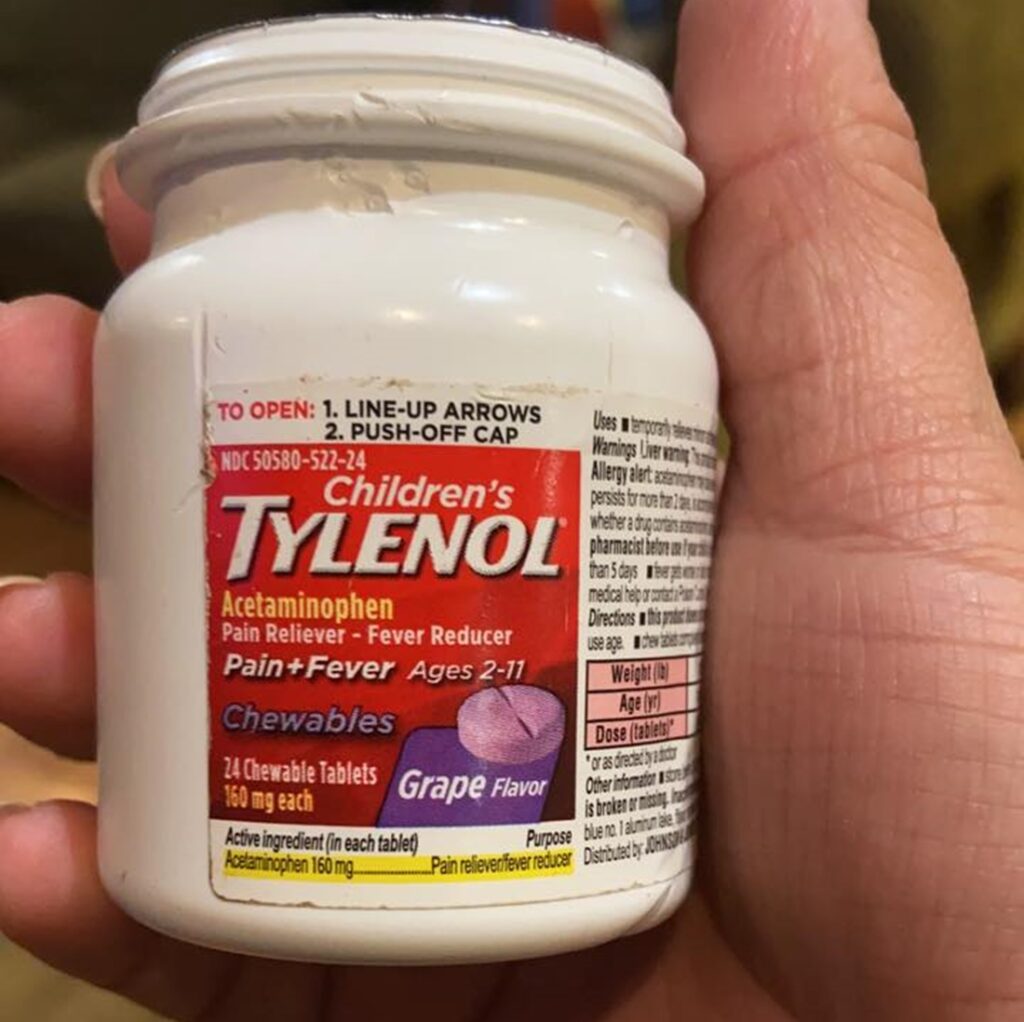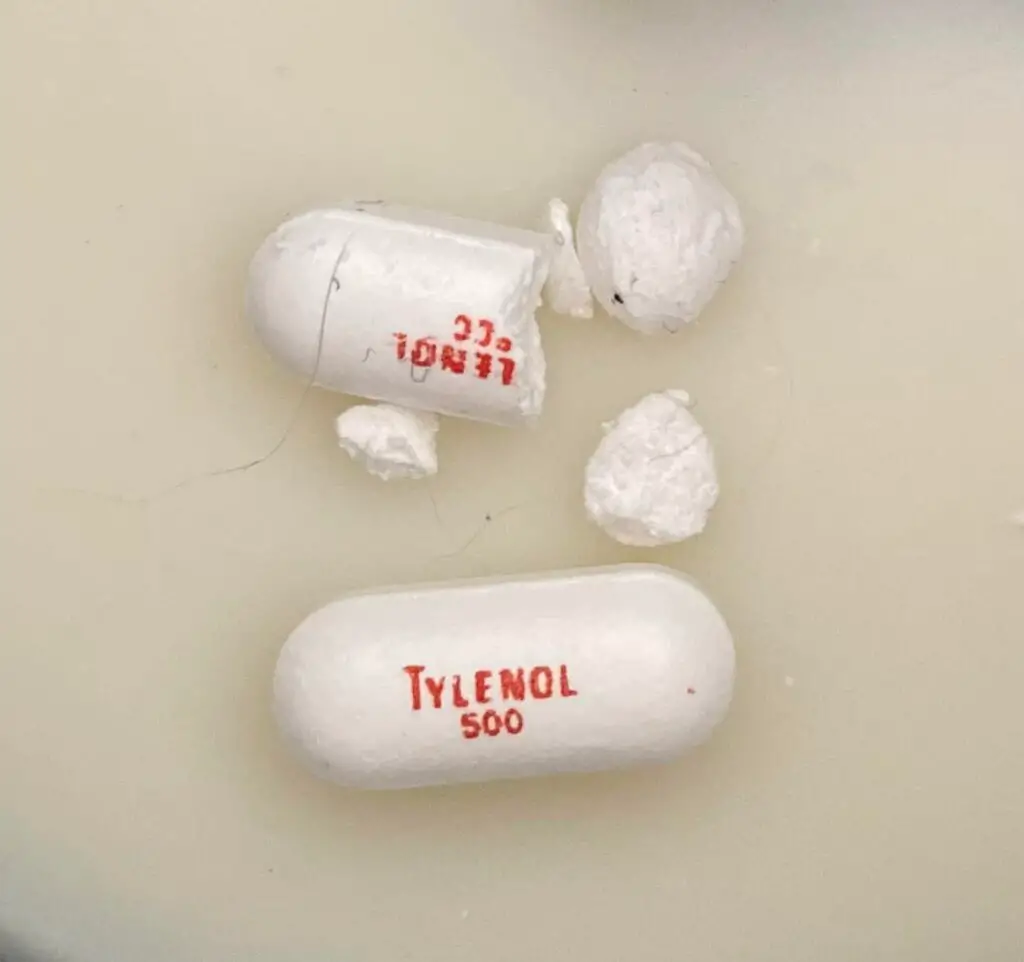Can Dogs Take Tylenol is a common question among pet owners when their canine friends are in pain.
While this over-the-counter medication is safe for humans, it can be toxic to dogs and should only be administered with veterinary guidance.
- Key Takeaway
- What Is Tylenol (Acetaminophen)?
- Can Dogs Safely Take Tylenol?
- How Much Tylenol Can I Give My Dog?
- How Much Acetaminophen (Tylenol) Is Toxic or Poisonous For Dogs?
- What Are The Signs of Acetaminophen (Tylenol) Poisoning In Dogs?
- Can I Give My Dog Tylenol 500mg?
- How Often Can Dogs Have Tylenol?
- Dog-Friendly Tylenol Substitutes
- How Can I Help My Dog In Pain At Home?
- FAQs
- Q: What should I do if my dog is in pain?
- Q: Can I give my dog human pain medication?
- Q: What are some signs of pain in dogs?
- Q: Can dogs take over-the-counter pain medication?
- Q: What are some safe pain relief options for dogs?
- Q: How can I help manage my dog’s pain?
- Q: What should I do if I think my dog is in severe pain?
- Q: Can dogs with osteoarthritis take pain medication?
- In Conclusion
Key Takeaway
- While dogs can technically take Tylenol (acetaminophen), it is not commonly recommended due to potential risks of kidney damage and liver problems, and should only be administered if prescribed by a veterinarian.
- A commonly prescribed dosage of Tylenol for dogs is 5 to 7 mg per pound of body weight two times daily, but it should only be given under the strict supervision of a veterinarian due to potential risks.
What Is Tylenol (Acetaminophen)?

Tylenol, also known by its generic name acetaminophen, is a common over-the-counter medication used to relieve pain and reduce fever.
It’s widely used in many forms, including tablets, capsules, and liquid, and is found in numerous combination medicines for colds, flu, and sleep aids.
Though it’s generally safe for human use when taken as directed, excessive amounts can lead to liver damage.
It’s important to note that while acetaminophen is safe for humans, it can be toxic for animals like dogs and cats, so they should not be given this medication without veterinary guidance.
Can Dogs Safely Take Tylenol?

Tylenol, also known as acetaminophen, is not generally recommended for dogs due to the potential for toxicity.
While some veterinarians may occasionally prescribe it under strict guidance for pain relief, over-the-counter usage by pet owners is discouraged.
Acetaminophen can pose serious health risks to dogs, even in relatively small doses, so it should only be administered if prescribed by a veterinarian.
It’s crucial to never self-medicate your pets and always consult with a professional for appropriate treatment options.
How Much Tylenol Can I Give My Dog?
Dogs can take 5 to 7 mg of Tylenol per pound of body weight two times daily, but it’s crucial to note that acetaminophen should be approved by vets.
Many veterinary toxicologists and professionals label acetaminophen as having a low safety margin for dogs, posing risks of liver and kidney damage.
Therefore, Tylenol should never be given to a dog unless under the strict supervision of a veterinarian. In fact, most sources advise against giving Tylenol to dogs at all due to its potential toxicity.
Instead, if your dog is in pain, consult with a vet who can prescribe a safer, more effective medication specifically designed for animals.
How Much Acetaminophen (Tylenol) Is Toxic or Poisonous For Dogs?
Toxicity in dogs may occur at doses of 100 mg/kg or 45 mg/lb of Tylenol.
This means that even relatively small amounts of acetaminophen can potentially be harmful to dogs.
It’s important to note that toxicity can depend on factors such as the dog’s weight and overall health.
What Are The Signs of Acetaminophen (Tylenol) Poisoning In Dogs?
Signs of acetaminophen (Tylenol) poisoning in dogs can include:
- Vomiting or diarrhea
- Loss of appetite
- Lethargy or weakness
- Difficulty breathing
- Dark-colored urine
- Jaundice (yellowing of the skin, whites of the eyes)
- Swelling or fluid accumulation in the face or paws
- Changes in behavior, such as depression or irritability
- Seizures or convulsions
- Coma in severe cases
What To Do If My Dog Ate Tylenol?

If your dog has ingested Tylenol, it’s crucial to act immediately due to the potential for toxicity. Firstly, do not induce vomiting unless instructed to do so by a professional.
Contact your local veterinarian or an animal poison control center as soon as possible.
They will be able to provide specific instructions based on your dog’s size, the amount of Tylenol consumed, and any symptoms your dog may be exhibiting.
Treatment may include inducing vomiting, administering activated charcoal to absorb the drug, and providing supportive care such as intravenous fluids and medications to protect the liver.
In severe cases, a blood transfusion may be necessary. It’s also important to monitor your dog closely for signs of toxicity, which can include lethargy, drooling, abdominal pain, swelling of the face or paws, difficulty breathing, dark-colored urine, and changes in behavior.
Remember, prevention is always better than cure – keep all medications out of reach of pets to prevent accidental ingestion.
Can I Give My Dog Tylenol 500mg?
The risk of toxicity is especially high with a dose as large as 500mg, which could easily exceed the safe dosage range for many dogs.
While Tylenol (acetaminophen) can be used in dogs under certain circumstances, it is generally not recommended due to its potential for toxicity.
Even small amounts can cause serious problems, such as liver damage or a decrease in the red blood cell’s ability to carry oxygen.
Therefore, you should never give your dog Tylenol, especially at such a high dose, without explicit direction from a veterinarian.
How Often Can Dogs Have Tylenol?
Under strict veterinary supervision, a dose of around 10mg per kilogram of body weight every 12 hours might be prescribed.
However, this should only be done under the direct guidance and supervision of a veterinarian.
It’s crucial to understand that even small amounts can cause serious problems such as liver damage or a decrease in the red blood cell’s ability to carry oxygen.
Therefore, it’s strongly advised not to give Tylenol or any other medication containing acetaminophen to dogs without consulting a veterinarian.
Dog-Friendly Tylenol Substitutes
While it’s crucial to consult your veterinarian before administering any medication to your pet, there are a few alternatives to Tylenol (acetaminophen) that can be safer for dogs.
These include:
- Carprofen (Rimadyl): This is a non-steroidal anti-inflammatory drug (NSAID) used to treat pain and inflammation due to arthritis or surgery.
- Meloxicam (Metacam): Another NSAID, this is often used to manage pain and reduce inflammation in dogs.
- Deracoxib (Deramaxx): This is another NSAID used for the control of pain and inflammation associated with osteoarthritis in dogs.
- Tramadol: Tramadol is a prescription opioid used to treat moderate to severe pain.
- Gabapentin: This is used to treat chronic pain in dogs, particularly neuropathic pain.
- Amantadine: This drug is often used in conjunction with other pain medications to treat chronic pain in dogs, such as arthritis pain.
How Can I Help My Dog In Pain At Home?
There are several methods you can use to help manage your dog’s pain at home. Always consult with your vet first to make sure these methods are safe and suitable for your pet.
Glucosamine and Chondroitin Supplements
These supplements can support joint health and potentially alleviate some of the discomfort associated with conditions like arthritis.
New Zealand Green Lipped Mussel
This supplement is known for its anti-inflammatory properties which can help reduce pain and inflammation.
Turmeric
Turmeric has anti-inflammatory benefits. It can be mixed with water, freshly ground black pepper, and organic MCT oil or coconut oil to create a paste for your dog.
Hot and Cold Therapies
Applying heat or ice for 20 minutes can help ease joint pain or injury in dogs.
Omega-3 Fatty Acids
Omega-3 fatty acids, found in fish oil, can help reduce inflammation, thus potentially decreasing pain.
Exercise
Many forms of exercise release natural endorphins which can help control pain in dogs.
Home Modifications
Help your dog maneuver around your home by providing ramps, padded beds, and other supportive equipment.
Natural Substances
CBD oil and green-lipped mussels are suggested as natural alternatives for pain relief.
Stretching Exercises
Allowing for stretching of muscles and tendons can help your dog relax, relieve pain associated with tension, and improve range of motion.
Ginger
Grating a little fresh ginger over your dog’s food can provide some pain relief benefits. Start with a small amount to help your dog’s taste buds adjust.
FAQs
Q: What should I do if my dog is in pain?
A: If you suspect that your dog is in pain, it is important to consult with a veterinarian. They can properly diagnose the cause of the pain and prescribe appropriate pain relief medication.
Q: Can I give my dog human pain medication?
A: No, you should never give your dog any medication that is meant for humans without consulting with a veterinarian first. Many human pain medications, such as ibuprofen and aspirin, can be toxic to dogs.
Q: What are some signs of pain in dogs?
A: Some common signs of pain in dogs include changes in behavior, such as aggression or withdrawal, decreased appetite, restlessness, panting, and limping. If you notice any of these signs, it is important to have your dog evaluated by a veterinarian.
Q: Can dogs take over-the-counter pain medication?
A: Over-the-counter pain medications, such as ibuprofen and aspirin, are not safe for dogs and should not be given to them. Always consult with a veterinarian for proper pain relief options for your dog.
Q: What are some safe pain relief options for dogs?
A: Your veterinarian may prescribe nonsteroidal anti-inflammatory drugs (NSAIDs) specifically formulated for dogs to help manage pain. There are also other pain relief options available, such as acupuncture and physical therapy. It is best to consult with your veterinarian to determine the most appropriate pain relief method for your dog.
Q: How can I help manage my dog’s pain?
A: There are several ways you can help manage your dog’s pain. This may include providing them with a comfortable environment, avoiding activities that may exacerbate their pain, and ensuring they are on a proper pain management plan prescribed by a veterinarian.
Q: What should I do if I think my dog is in severe pain?
A: If you suspect that your dog is in severe pain, it is important to seek immediate veterinary care. Severe pain may indicate a serious underlying condition that requires immediate attention.
Q: Can dogs with osteoarthritis take pain medication?
A: Yes, dogs with osteoarthritis can benefit from pain medication prescribed by a veterinarian. There are several options available that can help control pain and inflammation associated with osteoarthritis.
In Conclusion
In conclusion, Tylenol should generally not be administered to dogs unless prescribed by a veterinarian.
While there are some cases in which dogs can safely take the medication if it is the only available option, it is important to understand the potential risks associated with administering this medication to your pet.





Leave a Reply